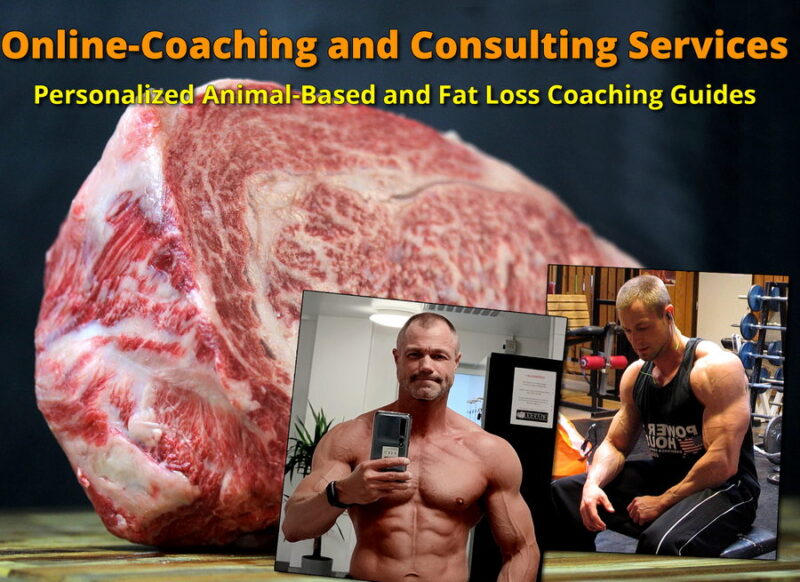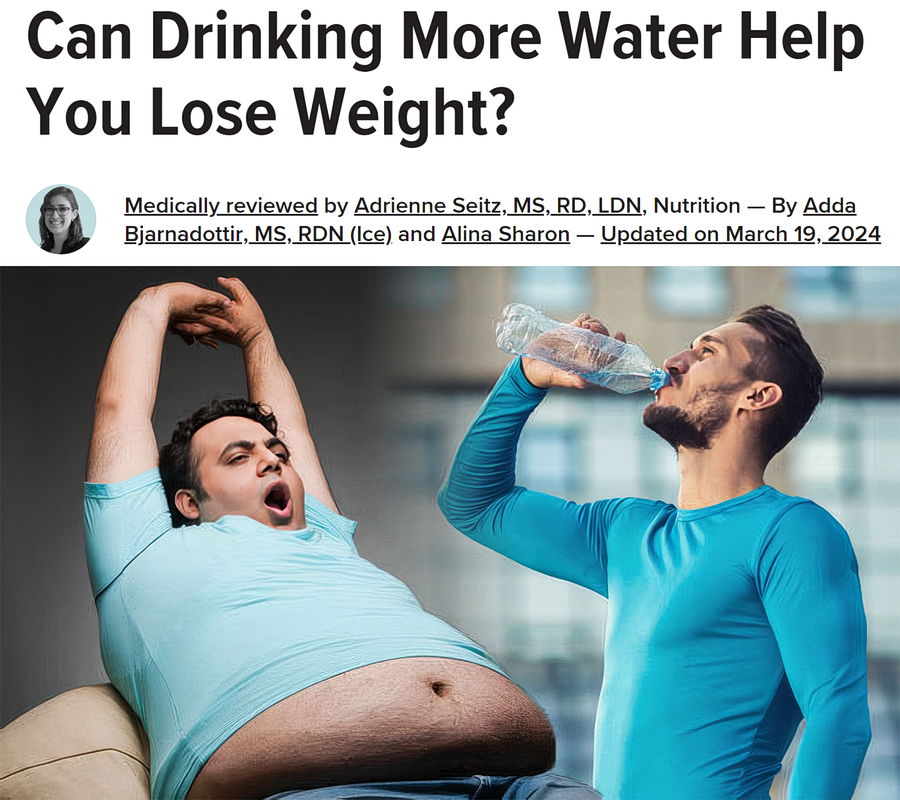A few days ago, the government-shill-website Healthline updated their article from 2023 on ‘drinking water to help with weight loss,’ written by some ‘Adda Bjarnadottir.’ Let’s see what they got wrong, or purposely lied about, this time.
The article begins with the following statement to reel in their gullible readers:
“Drinking water can help burn calories and reduce hunger cravings. Replacing sugary drinks with water can also lower caloric and sugar intake. But there isn’t enough evidence that water itself can help you lose weight.”
The first statement, right out of the gate, that you “burn calories” shows that Adda Bjarnadottir has no clue about human physiology. A calorie is a unit of heat-energy from burning something and increasing the temperature of a given mass of water by 1 °C. It’s a concept of physics, not a concept of physiology. You cannot burn or use “heat units” as energy. We do not extract energy from food to produce heat, we extract energy from food to provide components for our metabolic functions.
And while drinking water that is void of metabolic energy, and especially if it’s cold and need to be warmed up by our body, will use up a little bit of energy to be digested, metabolized, transported, and excreted, it’s totally irrelevant in the big picture, especially since drinking a lot of water is both unnatural and harmful to our health. And the fact that replacing sugary drinks with water will reduce sugar intake should be a no-brainer.
Let’s see where they go next.
Does drinking water make you burn calories?
“Water consumption is associated with increased sympathetic activity. Your body’s sympathetic system activates things like heart rate and metabolism.
Therefore, drinking water may help increase your metabolic rate and how much energy (or calories) you burn.”
At least you wrote ‘energy ‘this time and with the pseudo-scientific ‘calorie’ drivel hidden in a parenthesis. And, yes, as I wrote above, as soon as you swallow something your nervous system reacts and digestion begins, even if it’s just water. This is why dry fasting is so much more effective and healthier than water fasting, which I explained in my Dry Fasting article series.
However, simply managing some water will not require much energy, and again, drinking a lot of water is dangerous as water actually dehydrates you. Unless you add in minerals and electrolytes with your water consumption, it will deplete these instead as they are used for the extra storage and elimination, increasing dehydration and decreasing ‘cell’ function.
In fact, we do not need much water at all, unless we are very active and sweat a lot. Most of us could do perfectly fine with the fluids that are naturally present in raw meat and the natural metabolic water our bodies produces when we are perfectly healthy (2 to 3 liters a day.) However, most people cook their food, which dehydrate it, and they eat the wrong kinds of food, as in carbohydrates and fiber which requires more water, and most people are not metabolically healthy, so we need to drink some water and make sure we get some extra sodium (as in salt) and other electrolytes and minerals.
Some dog owners should be able to relate to this, even if they have not made the connection, as a dog being fed toxic and damaging dry food, as in kibble (which also gives them disease and cut their lifespan in half,) will drink a lot of water to help to eliminate all the toxins and waste, as well as eliminating all the toxic carbohydrates, while a dog fed its species-appropriate diet of only meat, bones and animal fat will hardly drink at all.
My dogs have always been fed a strict carnivore diet, and they only sip a little bit of water after very long walks and/or activity, perhaps 7 oz a day (2dl.)
Does drinking water before meals reduce appetite and calorie intake?
“When you drink water instead of other beverages, which may be high in calories and sugar, you are naturally reducing calorie consumption.”
Seriously, this is something you might need to explain to a kid whose parents have abused him or her by letting them drink soda, but do you really need to spell it out to adults?
And again, you cannot consume heat units, as in “calories.”
“One 2018 study suggests that drinking water before meals may help make you feel less hungry and eat less, but only in people of average weight and body mass index (BMI). It’s unclear how well this applies to people who are overweight or have obesity.”
Perhaps, but you should not drink right before, or during meals, as that will dilute your stomach acid and will hamper your digestion of the meal. If you need to drink water, do it between meals or at least 30 minutes before a meal.
Also, hunger and cravings are a signal that you have nutritional deficiencies, as in being malnourished, likely because you do not consume enough animal-based foods, which are the only source of bioavailable nutrients for humans.
Drinking water will simply blunt that signal for as long as digestion take place, as in moving that water from the stomach into the small intestine.
When you eat according to your physiology, as in consuming animal fat and protein, you will never feel hunger or cravings, not even when fasting for several days. Hunger and cravings have absolutely nothing to do with no longer “being full,” as in a fed state, it’s all about being nourished or not.
“For people who have problems with their metabolism or have obesity, drinking water may help burn more calories.”
No, not really. Not even 1% of you resting metabolic rate. And again, drinking a lot of water is very dangerous and should not be encouraged.
“Drinking water can stimulate your body to break down fat without raising your blood sugar or insulin, which may also support weight loss.”
No, this is not an effect of water consumption. However, people who rely more on water when “dieting” tend to go longer without food, as in consuming less snacks and even less meals as they replace them with gulping down a cup or two of water, which means that their bodies can finally tap into their fat metabolism and use some fat as energy. That is not an effect of water, it’s an effect of eating less frequently. The fact that the people behind the study this is quoted from does not recognize this simple fact, including the author, is quite frightening. But that is the sad state of “research” and “studies” nowadays.
Does drinking more water lower the chance of weight gain?
“Drinking water may also help prevent long-term weight gain. According to a 2013 study, the average person gains about 1.45 kg (3.2 lb) every 4 years.
According to the study, subjects who consumed 1 extra cup of water daily lowered their weight gain by 0.13 kg (0.23 lb).”
First off, studies like these are based on yearly or quarterly questionnaires where people either do their best to remember what they did, or simply fill it out to sound “good enough.” Still, if some people replace a snack with a cup of water, that will of course reduce the likelihood of a weigh gain. That’s kind of common sense.
“In a newer 2019 review, researchers found that the results of all the studies indicated that drinking more water was linked with more weight loss.
The weight loss ranged between 0.4–8.8 kg, and the mean weight loss was 5%. However, the researchers said the most weight loss was seen when water was the beverage of choice rather than high caloric options.”
Seriously, was this article written for people with mental disabilities? Of course, weight loss will be better if you drink water instead of a beverage containing energy, as in carbohydrates/sugar. Also, drinking such beverages as soda or juices is extremely deceiving, as they can contain enormous amounts of carbohydrates in just a single cup, and people tend to drink entire bottles in one sitting, grossly underestimating how much energy they pour into their bodies.
How much water should I drink a day to lose weight?
“Many health authorities recommend drinking 74 oz (2.2l) for females and 101 oz (3l) for males of water per day.”
For most people who are moderately active, who cook their food, and are metabolically unhealthy, that sounds about right. However, they also need to make sure they get the correct form of sodium, as in sea salt (pure sodium,) and not the toxic table salt (sodium chloride) that also is hidden in all processed plant-based garbage foods.
As contrast, I’m about 90% raw carnivore and I drink perhaps 0.5 to 1 liter of water a day depending on activity levels and weather (17 to 35 oz,) and with that I take about a teaspoon of Celtic Sea Salt daily and a pinch of Sea Salt from Spain on my raw meat.
After this, Healthline did a little section of “frequently asked questions,” where they lied about fasting, saying that people lost about 5kg during a 5-day water fast, but it was only “water weight,” which of course is impossible, as all your energy needs during a fast comes from the breakdown of stored body fat and recycling of damaged proteins, as in damaged tissue.
But yes, most of it is water weight. An average sized person might be able to lose close to 1kg of body fat from water fasting for 5 days. And more than double that if dry fasting. Again, check my articles on fasting for real information and real-life results.
To conclude, do not rely on water for fat loss. Instead, make sure you adopt our species-appropriate, species-specific diet of animal fats and protein. Humans are obligate hyper carnivores, and that is the only way to get all the nutrients we need to be fully healthy. From there, fat loss is extremely easy and can be accelerated by strategic use of fasting.
If you need help with fat loss and/or transitioning from your current way of eating to our natural species-appropriate, species-specific way of eating, I’m available for both coaching and consultation.

